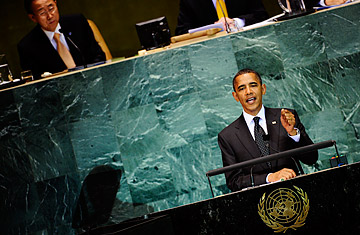
President Obama addresses the Millennium Development Goals Summit at the U.N. in New York City
President Obama on Thursday used his annual address to the U.N. General Assembly to urge Arab leaders to do more to support his Middle East peace efforts. But while they'll continue to provide political cover for the Palestinian leadership to participate in talks with the Israelis, even the most pro-U.S. Arab regimes remain unlikely to heed Obama's exhortations to move toward normalizing their ties with the Jewish state before it resolves its territorial conflicts with the Palestinians and with Syria.
The President's U.N. address followed the convention of talking up U.S. global citizenship, highlighting Washington's efforts to promote global economic recovery, fight climate change and bring relief to the victims of Haiti's earthquake and Pakistan's floods. Despite addressing an audience of world leaders, Obama was clearly mindful of his domestic audience, particularly in discussing Iran. It's widely expected by analysts that the standoff over Iran's nuclear program is about to head into a new round of negotiations, and Obama appeared to be setting the stage — and preempting domestic critics — by suggesting that the sanctions adopted until now had "held Iran accountable" for its failure to meet its international obligations. At the same time, he stressed the desire of the U.S. and its allies to "seek a resolution to our differences with Iran, and the door remains open to diplomacy should Iran choose to walk through it. But the Iranian government must demonstrate a clear and credible commitment, and confirm to the world the peaceful intent of its nuclear program."
But the most important portion of the speech — judging by the excerpts released by the White House on Wednesday evening — was about the Administration's Middle East peace efforts. Obama acknowledged the widespread skepticism over prospects for success in the talks he has orchestrated between Israeli Prime Minister Benjamin Netanyahu and Palestinian Authority President Mahmoud Abbas but warned that the consequences of failure should be uppermost in the minds of the parties and of the international community. He urged Israel to continue its partial moratorium on settlement construction, which is due to expire on Sunday, and also urged the Palestinians to remain at the table until the process is complete. (They have threatened to walk away if settlement construction resumes.) Obama also reiterated his call for Arab states to take "tangible steps toward ... normalization" of ties with Israel, citing the Arab League's 2002 peace offer that promises full diplomatic relations in exchange for Israel's withdrawing to its 1967 borders.
Urging Arab leaders to get behind politically beleaguered Abbas and give active support for his efforts through gestures toward Israel, Obama said the choice was between returning to the same U.N. forum next year, "as we have for the last 60 years and mak(ing) long speeches about [the conflict] ... [and] wast[ing] more time by carrying forward an argument that will not help a single Israeli or Palestinian child achieve a better life ... Or we can say this time will be different ... [and] we can have an agreement that will lead to a new member of the United Nations — an independent, sovereign state of Palestine, living in peace with Israel."
But his appeal is unlikely to spur new outreach gestures toward Israel from Arab regimes that have given skeptical support to the current talks. While the Arab Peace Initiative promises reconciliation with Israel, it frames that as quid pro quo for Israel's ending its occupation of Syrian territory on the Golan Heights and of the West Bank and East Jerusalem. Obama made a similar appeal to the Arabs last year, at the same time that he demanded a freeze on all Israeli construction outside of its 1967 borders. The Arabs declined, seeing a halt to settlement activity as an Israeli obligation rather than a concession to be rewarded. Netanyahu, for his part, accepted a freeze on some construction but insisted on exempting East Jerusalem and public buildings in West Bank settlements.
The U.S.-aligned Arab states are no less skeptical of Netanyahu's intentions regarding the 1967 borders than is Abbas — the Palestinian leader, remember, had to be strong-armed into the current talks. Even Obama's promise that next year's U.N. assembly could see "an agreement that would lead to" a Palestinian state might be greeted with a measure of bitterness. The objective of the negotiations is not a treaty whose signing would initiate the birth of a Palestinian state; instead, the Administration is seeking a "framework agreement" that would provide a more detailed sketch of the parameters of a two-state solution to be implemented at some unspecified date in the future. That may be all the Netanyahu government is willing to do right now, but the Arab states believe that setting such a modest goal almost two decades into the peace process is simply prevaricating. Still, where they do agree with Obama is that they have no alternative but to go along with whatever process the Americans offer. They'd like to see Obama demand a lot more of Israel; they know that's not going to happen. But given the limits of what's on offer, they remain unlikely to take the domestic political risks of normalizing relations with Israel.
